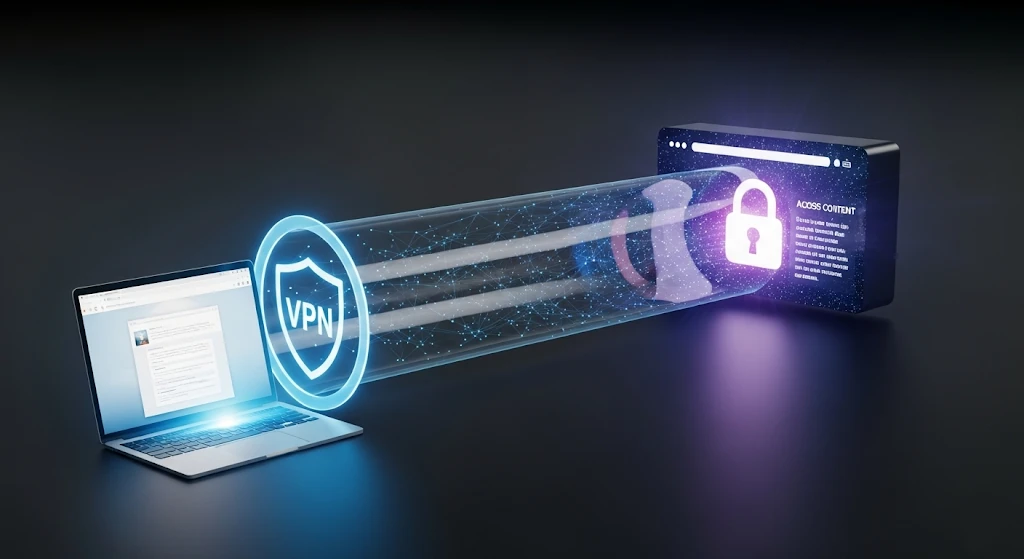
It seems like yesterday when traveling meant temporarily leaving behind the comforts of watching your favorite shows, content, and websites. From streaming services like Netflix to essential online services, geographic restrictions can limit what you can see and do online. Now, there’s no longer a need for such sacrifice, as frequent travelers are slipping through challenges when it comes to accessing content and websites. What’s making this possible? Behold! Virtual Private Networks (VPNs) at your service. VPNs are becoming increasingly important for travelers looking to bypass restrictions and enjoy a more open internet. Sit back, relax, and explore how VPNs can make your travel experience not only smoother but also more secure.
Before Going Online: Know What a VPN Is and How It Works
A VPN, or Virtual Private Network, is a service that encrypts your internet connection and routes it through a server in a location of your choice. This process masks your real IP address with one from the server’s location, making it appear like you are browsing from that region. This is particularly useful for accessing geo-restricted content from other countries at your home’s comfort. It also works on the flip side, where you can watch programs from your home country while vacationing in foreign territories. By using a VPN, you can bypass regional restrictions and maintain your online privacy, enhancing your overall digital experience while traveling.
Why Do Travelers Need a VPN?
Travelers often need VPNs for several reasons. One key reason is to bypass geo-restrictions on content and websites. We gain valuable insight from Mr. Ballen’s NordVPN experience that streaming services like Netflix, BBC iPlayer, or Amazon Prime Video offer different libraries based on the user’s location. Using NordVPN made his browsing safer and allowed him to stay updated with content from back home while traveling abroad. By using a VPN, travelers access their home country’s content no matter where they are in the world. Additionally, VPNs provide increased security on public Wi-Fi networks, protecting sensitive information from potential hackers.
Different Strokes, Different Folks: Types of VPNs
There are several types of VPNs available to suit various needs and preferences. Among the most popular are Remote Access VPNs, which allow individual users to connect to a private network remotely. This type is ideal for travelers and remote workers who need secure access to their company’s network or to protect personal data privacy while away from home. Another type is Site-to-Site VPNs, often used by businesses to connect different office locations over the internet securely. These are particularly useful for companies with multiple branches that need to share resources and data securely. Lastly, Personal VPNs are designed for individual users who wish to enhance their online privacy and access geo-restricted content. This type is user-friendly and often comes with easy-to-use apps, making it accessible even to those without technical expertise. Understanding these types can help travelers choose the right VPN based on their specific needs, ensuring a safe and unrestricted online experience.
Security and Privacy: Protecting Your Data on the Go
Let’s face it, we can’t always have access to secure internet connection overseas. Traveling often entails connecting to unsecured public Wi-Fi networks, which can expose your personal data to hackers. VPNs play a critical role in safeguarding your information:
- Data Encryption: VPNs encrypt your internet traffic, making it difficult for cybercriminals to intercept and read your data.
- Privacy Protection: By masking your IP address, VPNs prevent websites and online services from tracking your location and browsing habits.
- Safe Online Transactions: VPNs add a layer of security when conducting online transactions, ensuring your financial information remains confidential.
Whatever Floats Your Boat: Tips for Choosing the Right VPN
When choosing the right VPN, there are several factors you should consider to ensure you get the best experience. Firstly, server locations are crucial; a VPN provider with a wide range of servers in different countries will offer more options for accessing restricted content. Secondly, speed and performance matter significantly; a slow connection can hinder your browsing and streaming experience. Look for VPNs that boast high-speed servers and minimal lag. Security features are equally important; ensure the VPN provides strong encryption, a no-logs policy, and an automatic kill switch to protect your data. Additionally, consider the ease of use and compatibility; a user-friendly interface and apps compatible with multiple devices will make your experience more versatile and smoother. Lastly, examine the cost and customer support; while free VPNs exist, premium options often offer better reliability and customer service. Balancing these factors will help you choose a VPN that best meets your needs for secure and unrestricted internet access while traveling.
Tips for Choosing right VPN
By now, you would agree that VPNs are becoming indispensable for travelers — offering a secure way to access restricted content and protect your data on the go. By understanding how VPNs work and selecting the right one for your needs, you can enjoy seamless and secure internet access regardless of where your adventures take you. Embrace the power of VPNs and make your travels more connected and safer.


